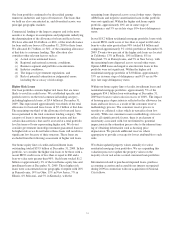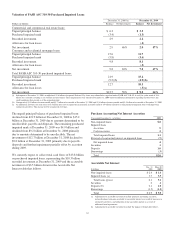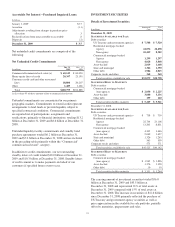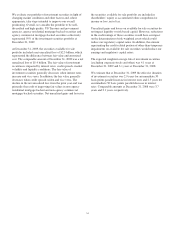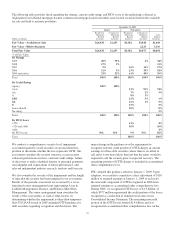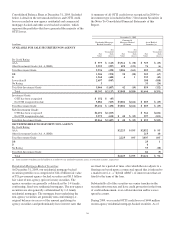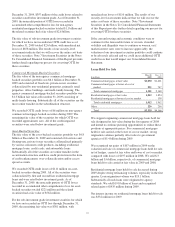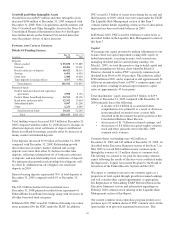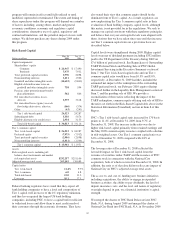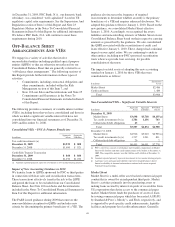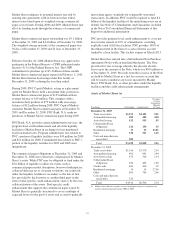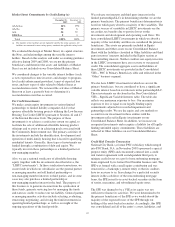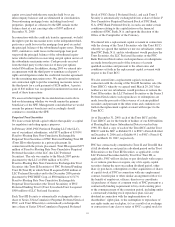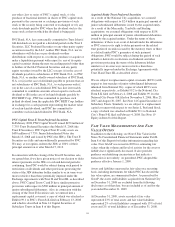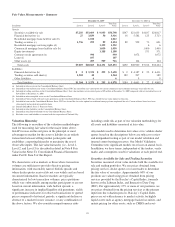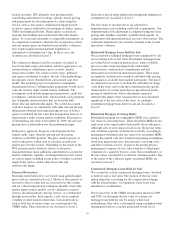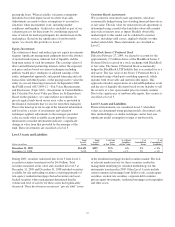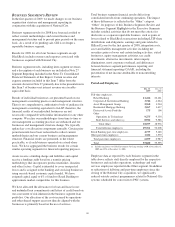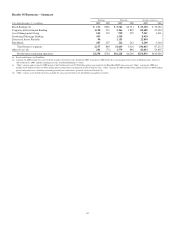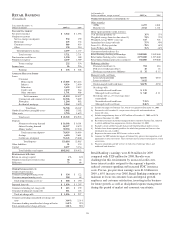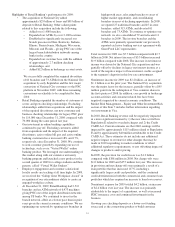PNC Bank 2009 Annual Report Download - page 45
Download and view the complete annual report
Please find page 45 of the 2009 PNC Bank annual report below. You can navigate through the pages in the report by either clicking on the pages listed below, or by using the keyword search tool below to find specific information within the annual report.
Market Street mitigates its potential interest rate risk by
entering into agreements with its borrowers that reflect
interest rates based upon its weighted average commercial
paper cost of funds. During 2008 and 2009, Market Street met
all of its funding needs through the issuance of commercial
paper.
Market Street commercial paper outstanding was $3.1 billion
at December 31, 2009 and $4.4 billion at December 31, 2008.
The weighted average maturity of the commercial paper was
36 days at December 31, 2009 and 24 days at December 31,
2008.
Effective October 28, 2008, Market Street was approved to
participate in the Federal Reserve’s CPFF authorized under
Section 13(3) of the Federal Reserve Act. The CPFF
commitment to purchase up to $5.4 billion of three-month
Market Street commercial paper expired on February 1, 2010.
Market Street had no borrowings under this facility at
December 31, 2009 or during the year then ended.
During 2009, PNC Capital Markets, acting as a placement
agent for Market Street, held a maximum daily position in
Market Street commercial paper of $135 million with an
average balance of $19 million. This compares with a
maximum daily position of $75 million with an average
balance of $12 million during 2008. PNC Capital Markets
owned no Market Street commercial paper at December 31,
2009 and December 31, 2008. PNC Bank, N.A. made no
purchases of Market Street commercial paper during 2009.
PNC Bank, N.A. provides certain administrative services, the
program-level credit enhancement and all of the liquidity
facilities to Market Street in exchange for fees negotiated
based on market rates. Program administrator fees related to
PNC’s portion of liquidity facilities were $43 million for 2009
and $21 million for 2008. Commitment fees related to PNC’s
portion of the liquidity facilities for 2009 and 2008 were
insignificant.
The commercial paper obligations at December 31, 2009 and
December 31, 2008 were effectively collateralized by Market
Street’s assets. While PNC may be obligated to fund under the
$5.6 billion of liquidity facilities for events such as
commercial paper market disruptions, borrower bankruptcies,
collateral deficiencies or covenant violations, our credit risk
under the liquidity facilities is secondary to the risk of first
loss provided by the borrower or another third party in the
form of deal-specific credit enhancement, such as by the over-
collateralization of the assets. Deal-specific credit
enhancement that supports the commercial paper issued by
Market Street is generally structured to cover a multiple of
expected losses for the pool of assets and is sized to generally
meet rating agency standards for comparably structured
transactions. In addition, PNC would be required to fund $.4
billion of the liquidity facilities if the underlying assets are in
default. See Note 25 Commitments And Guarantees included
in the Notes To Consolidated Financial Statements of this
Report for additional information.
PNC provides program-level credit enhancement to cover net
losses in the amount of 10% of commitments, excluding
explicitly rated AAA/Aaa facilities. PNC provides 100% of
the enhancement in the form of a cash collateral account
funded by a loan facility. This facility expires in March 2013.
Market Street has entered into a Subordinated Note Purchase
Agreement (Note) with an unrelated third party. The Note
provides first loss coverage whereby the investor absorbs
losses up to the amount of the Note, which was $8.0 million as
of December 31, 2009. Proceeds from the issuance of the Note
are held by Market Street in a first loss reserve account that
will be used to reimburse any losses incurred by Market
Street, PNC Bank, N.A. or other providers under the liquidity
facilities and the credit enhancement arrangements.
Assets of Market Street (a)
In millions Outstanding Commitments
Weighted
Average
Remaining
Maturity
In Years
December 31, 2009
Trade receivables $1,551 $4,105 2.01
Automobile financing 480 480 4.20
Auto fleet leasing 412 543 .85
Collateralized loan
obligations 126 150 .36
Residential mortgage 13 13 26.01
Other 534 567 1.65
Cash and miscellaneous
receivables 582
Total $3,698 $5,858 2.06
December 31, 2008
Trade receivables $1,516 $3,370 2.34
Automobile financing 992 992 3.94
Auto fleet leasing 473 560 1.34
Collateralized loan
obligations 306 405 1.58
Credit cards 400 400 .19
Residential mortgage 14 14 27.00
Other 695 765 2.06
Cash and miscellaneous
receivables 520
Total $4,916 $6,506 2.34
(a) Market Street did not recognize an asset impairment charge or experience any
material rating downgrades during 2008 or 2009.
41


